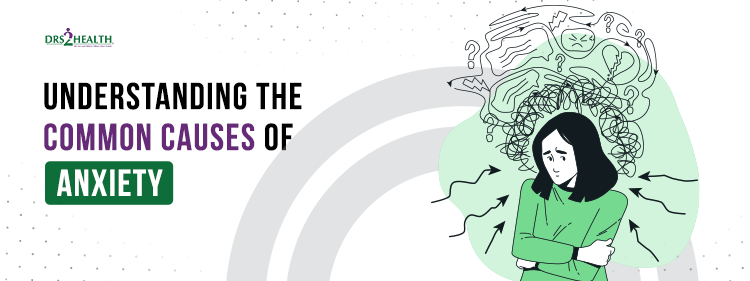
May 9, 2025
HPV Infection and Cervical Cancer: Signs, Stages, and Solutions.
347-843-0789
doctors@doctorstohealth.com

Anxiety is a natural response to stress, but when it becomes persistent, overwhelming, or difficult to control, it can significantly impact daily life. At DRS2Health, we believe in exploring the root causes of anxiety to help you better understand your mental health and find pathways to peace.
Let’s delve into some common causes of anxiety and how they manifest in our lives:
Long-term exposure to stress can overwork your body’s natural coping mechanisms. Work pressures, financial worries, or personal conflicts can lead to heightened levels of anxiety. When stress becomes chronic, it disrupts hormonal balance and triggers persistent feelings of fear or worry.
Tip: Incorporate stress management techniques like mindfulness, meditation, or regular exercise to help mitigate the effects of chronic stress.
Anxiety can run in families. If your parents or close relatives have experienced anxiety disorders, you may have a higher likelihood of facing similar challenges. This doesn’t mean it’s inevitable—understanding your family history can help you stay proactive in managing your mental health.
Tip: Consider consulting a professional for early interventions if you have a family history of anxiety disorders.
Your surroundings play a crucial role in influencing anxiety levels. A stressful work environment, exposure to violence, or living in an unsafe neighborhood can act as triggers. Additionally, significant life changes, such as moving, starting a new job, or coping with loss, can exacerbate feelings of unease.
Tip: Create a safe and calming space in your home and practice grounding techniques to navigate environmental stressors.
Poor diet, lack of sleep, or over-reliance on stimulants like caffeine and alcohol can contribute to anxiety. Your body’s physical state directly impacts your mental well-being, and neglecting self-care can amplify feelings of nervousness and tension.
Tip: Prioritize a balanced diet, maintain a consistent sleep schedule, and moderate your intake of stimulants to keep your body and mind in harmony.
Sometimes, anxiety is linked to underlying medical conditions such as thyroid imbalances, heart problems, or chronic illnesses. Certain medications can also trigger anxiety as a side effect.
Tip: If you notice sudden or severe anxiety symptoms, consult your healthcare provider to rule out any underlying medical issues.
Unresolved trauma from the past, such as abuse, neglect, or a significant loss, can linger in your subconscious and contribute to anxiety. Conditions like Post-Traumatic Stress Disorder (PTSD) often stem from traumatic experiences, leading to heightened states of alertness and fear.
Tip: Therapy can be instrumental in helping you process and move forward from traumatic events.
Your inner dialogue shapes how you perceive and react to situations. Persistent negative thoughts, self-doubt, and irrational fears can create a loop of anxiety that becomes hard to escape.
Tip: Cognitive Behavioral Therapy (CBT) is a powerful tool for challenging and reframing negative thought patterns.
Hormonal fluctuations, particularly during puberty, pregnancy, postpartum, or menopause, can significantly affect mood and anxiety levels. These changes can alter brain chemistry and increase vulnerability to anxiety disorders.
Tip: Consult with a healthcare provider to explore ways to manage hormonal imbalances.
Feeling isolated or lacking a strong support network can intensify anxiety. Humans are social beings, and connections with others provide a sense of belonging and security.
Tip: Build a circle of trust with family, friends, or support groups. Sometimes, simply sharing your feelings can ease the burden of anxiety.
The uncertainty of life can be overwhelming for many people. Fear of the future, job instability, or unpredictable changes can lead to excessive worrying and heightened anxiety.
Tip: Focus on what you can control and practice techniques like journaling or gratitude exercises to maintain perspective.
At DRS2Health, we recognize that every individual’s journey with anxiety is unique. By understanding these common causes, you can take proactive steps to address them and reclaim your peace of mind.
If anxiety has been affecting your quality of life, remember, you don’t have to face it alone. Our naturopathic approach offers holistic solutions that address both the mind and body. Schedule a consultation today to start your journey toward better mental health.

Leave a comment